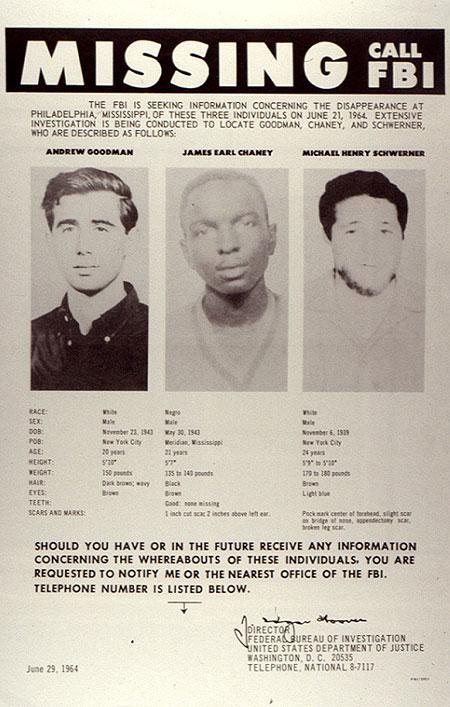Pre reading:
The following is a quote taken from the film, Mississippi Burning.
Mayor Tilma: “Do you like baseball, do you, Anderson?”
Agent Anderson: “Yeah, I do. You know, it's the only time when a black man can wave a stick at a white man and not start a riot.”
With a partner discuss your interpretation of this quote.
Historical Background

The mysterious circumstances surrounding a case in 1964 of the disappearance and eventual murders of three civil rights workers is the backdrop for this powerful film produced in 1988. James Chaney, age 21 (black), Andrew Goodman, age 20 (white) and Michael Schwerner, age 24 (white) headed south to Mississippi, as volunteers for a program called Freedom Summer. The program focused on voter registration for blacks in the “closed” state of Mississippi. Immediately after their arrival they were arrested by the local police and later found shot to death.
As this was a time of great tension and unrest, due to the advancement of the Civil Rights Movement, there was massive media coverage and the FBI was called in to investigate. For the next six weeks the story unfolds revealing racism, hatred and corruption on all levels. The director, Alan Parker released the film as a dramatization of these events.
A Northerner and a Southerner
The two FBI agents (Gene Hackman and Willem DaFoe) couldn’t be more different from one another and their approaches to solving the murders set them apart. Agent Alan Ward (DaFoe) is portrayed as a younger, “by the book” agent from the north, who is naive of race relations in the south, while Agent Rupert Anderson (Hackman), having been a former Mississippi sheriff, has first-hand experience, including the unspoken rules of the south. They often disagree on their methods, yet manage to learn from one another and solve the case together.
Tasks and Activities
Watch the trailer for Mississippi Burning and then answer the questions below.
Comprehension
- Do you think the two men at the beginning of the trailer were speaking to the same audience?
- Why were black people marching in the streets with American flags?
- What was meant by “you in Mississippi now”?
- Who are the people with the white hoods on?
- What were they searching for in the river?
- How was the media treated?
- Why were homes and churches being bombed?
- Where were the people all dressed in black going?
- Why was America at war with itself in 1964?
Discussion
The following is taken from a scene, towards the end of the film when Agent Anderson re-visits the Mayor’s wife. The Mayor is a racist while his wife remains neutral. Her role is the dutiful wife. In this quote she seems to be facing her reality.
Mrs. Pell: “It's ugly. This whole thing is so ugly. Have you any idea what it's like to live with all this? People look at us and only see bigots and racists. Hatred isn't something you're born with. It gets taught. At school, they said segregation is what's said in the Bible... Genesis 9, Verse 27. At 7 years of age, you get told it enough times, you believe it. You believe the hatred. You live it... you breathe it. You marry it.”
Discuss this quote in small groups. Do you agree with Mrs. Pell? Do you sympathize with her? Who is responsible for bigotry and racism? Do we copy other people’s actions? Can racist people change?
Research
The national attention brought on by this case helped advance the Civil Rights Movement. Two historic acts were passed in the US government, the Civil Rights Act of 1964 and the Voting Rights Act of 1965. Find out about these two acts and how they brought blacks one step closer to equality.